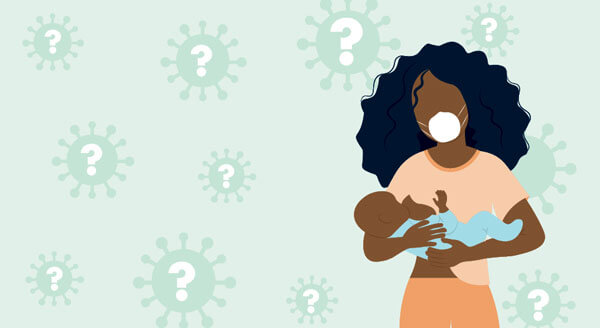 Breastfeeding is one of the best decisions you can make for your baby. Not only does it protect infants from many infections, it is also great for moms.
Breastfeeding is one of the best decisions you can make for your baby. Not only does it protect infants from many infections, it is also great for moms.
During breastfeeding, hormones released in the mother’s body promote wellness and help the mom relieve stress and anxiety. However, the emergence of COVID-19 has caused many to wonder how the virus impacts breastfeeding. As a mother, you may have some questions. Let’s cover a few of the most common ones we hear.
Can I pass COVID-19 to my child through breastfeeding?
There is no evidence that breast milk protects babies from SARS-CoV-2, the virus that causes COVID-19. COVID-19 has not been found in breast milk, so it is completely safe to breastfeed if you have COVID-19. However, new moms with COVID-19 could spread the virus to their infant via tiny droplets of saliva when they talk, cough, or sneeze.
Can I get vaccinated while breastfeeding?
Yes. COVID-19 vaccines are considered safe for breastfeeding mothers and babies. Despite recommendations for pregnant and breastfeeding women to get vaccinated, the majority of pregnant women remain unprotected against COVID-19.
What if I am not fully vaccinated and want to breastfeed my baby?
COVID-19 spreads during close contact when an infected person coughs, sneezes, or talks. Current studies show that the virus has not been found in breast milk, and breastfeeding is also safe when moms have other viral illnesses like the flu.
If I have COVID-19, can I stay in the same room with my infant?
Yes, but it is essential to take precautions until you have been fever-free for 24 hours without taking any medications that mitigate fever. Keep a reasonable distance when possible. Wear a mask and wash your hands whenever you directly care for your baby. Be sure to keep the room as sanitized as possible to remove any lingering germs. Additionally, during this time, it’s absolutely fine to pump your breast milk and give it to your baby in a bottle.
How can I maintain my milk supply if I am sick with COVID-19?
Hand pumping and hand expressing breast milk to get the milk supply going are especially helpful in the first few days after your baby is born. Frequent pumping should align with your infant’s in 24 hours.
Most medications are safe to take while breastfeeding, but you should always check with your doctor before introducing any medication to your body while breastfeeding.
THE IMPORTANCE OF VACCINES FOR PREGNANT WOMEN
Vaccines will help protect both you and your baby from vaccine-preventable diseases. It’s safe to get the vaccines
recommended during pregnancy. Like any medicine, vaccines can have side effects. However, these side effects are usually mild and go away without outside intervention.
The mounting evidence about the safety and effectiveness of COVID-19 vaccination during pregnancy has been consistent. The data suggests that the benefits of receiving a COVID-19 vaccine outweigh any known or potential risks of vaccination during pregnancy.
CDC recommends that everyone start their vaccine series or get a booster dose with either Pfizer-BioNTech or Moderna (mRNA COVID-19 vaccines). Still, the J&J/Janssen vaccine may be considered in some situations.
Regardless, anyone trying to get pregnant now, or who might become pregnant in the future, should get vaccinated and/or boosted.
Find a vaccine location near you at thewellnesscoalition.org/COVID.
